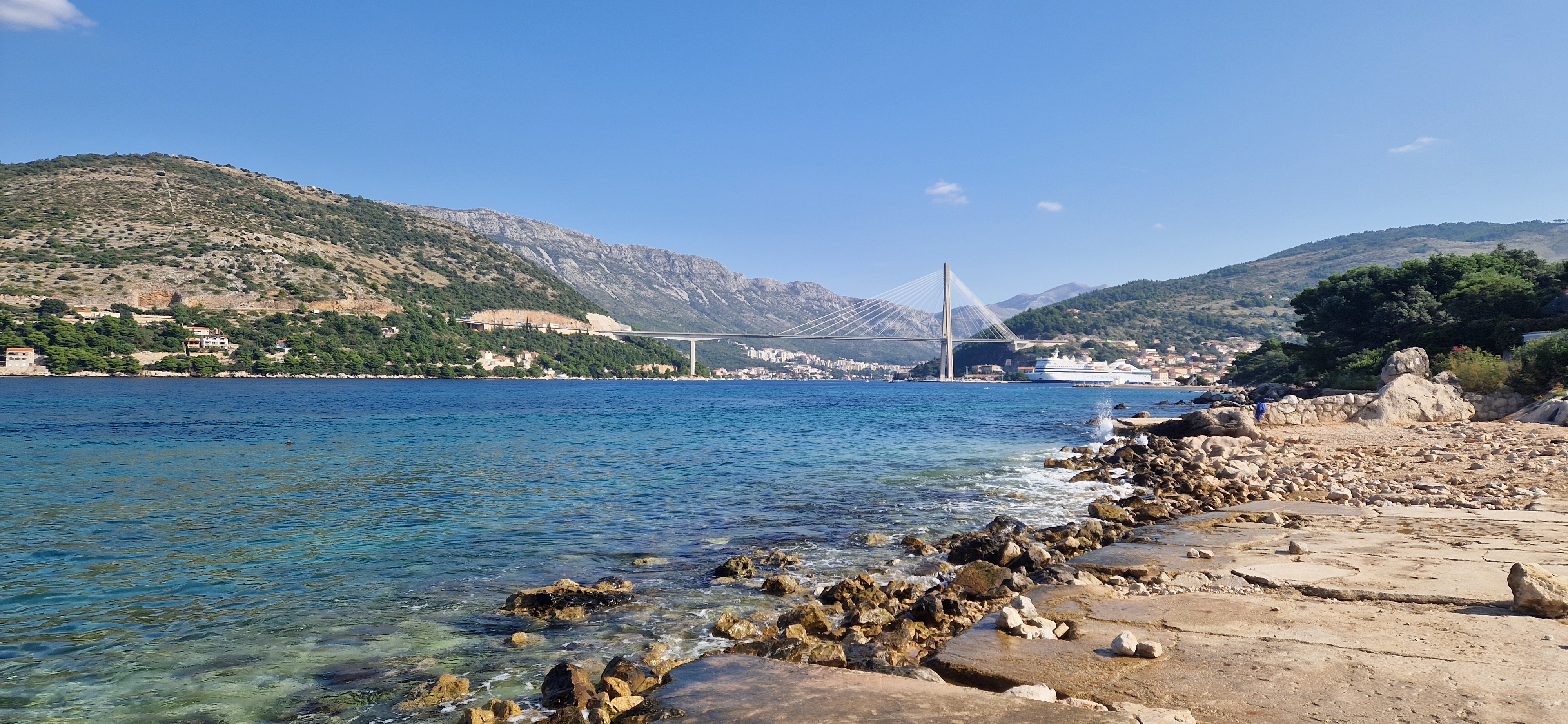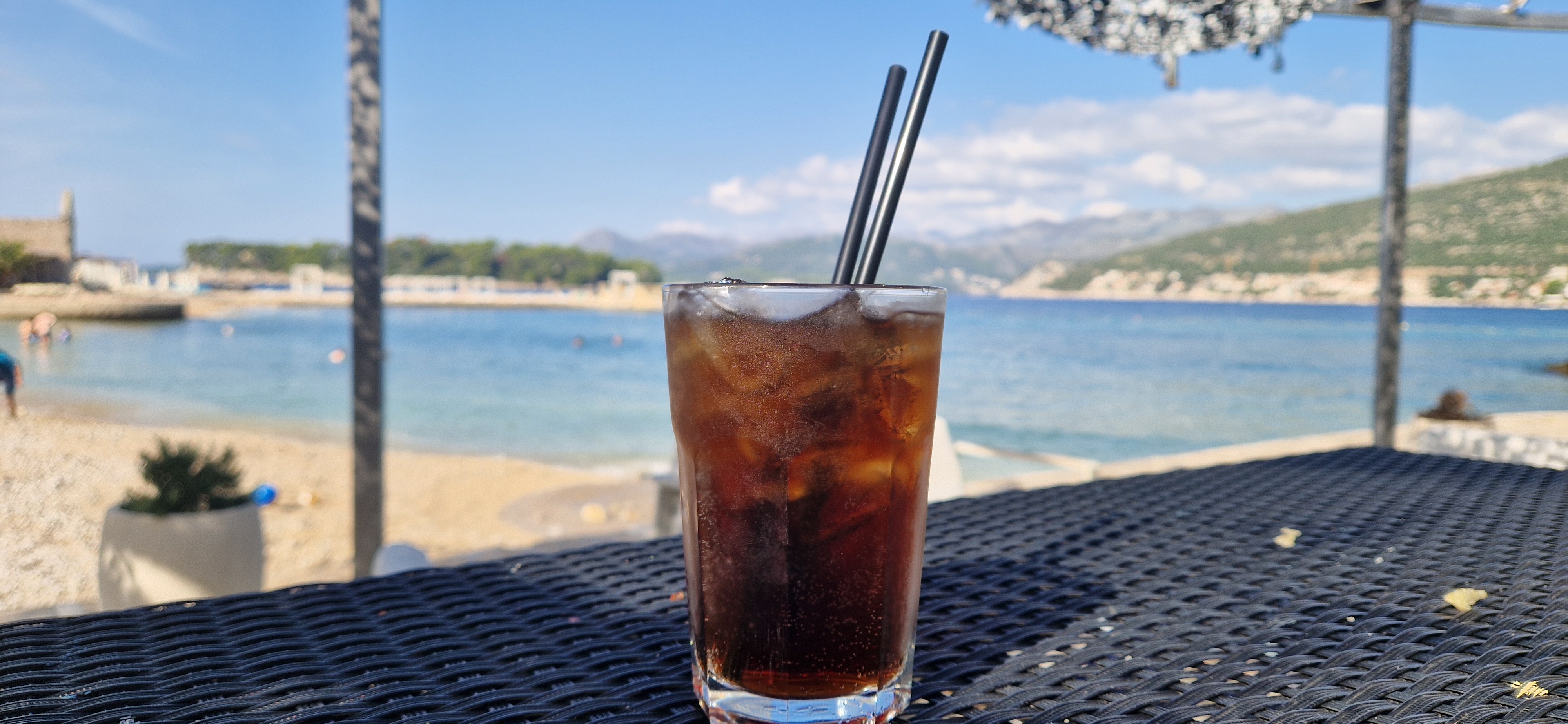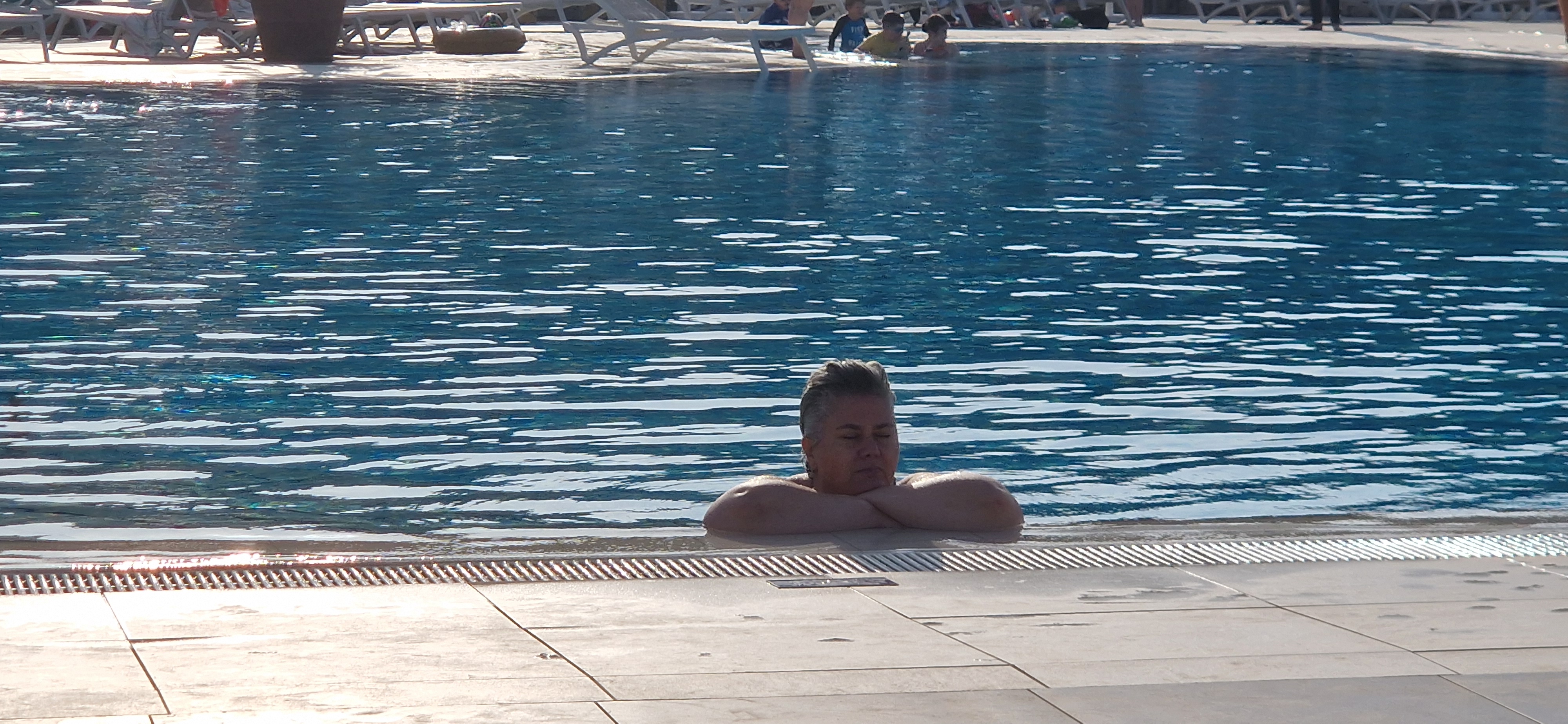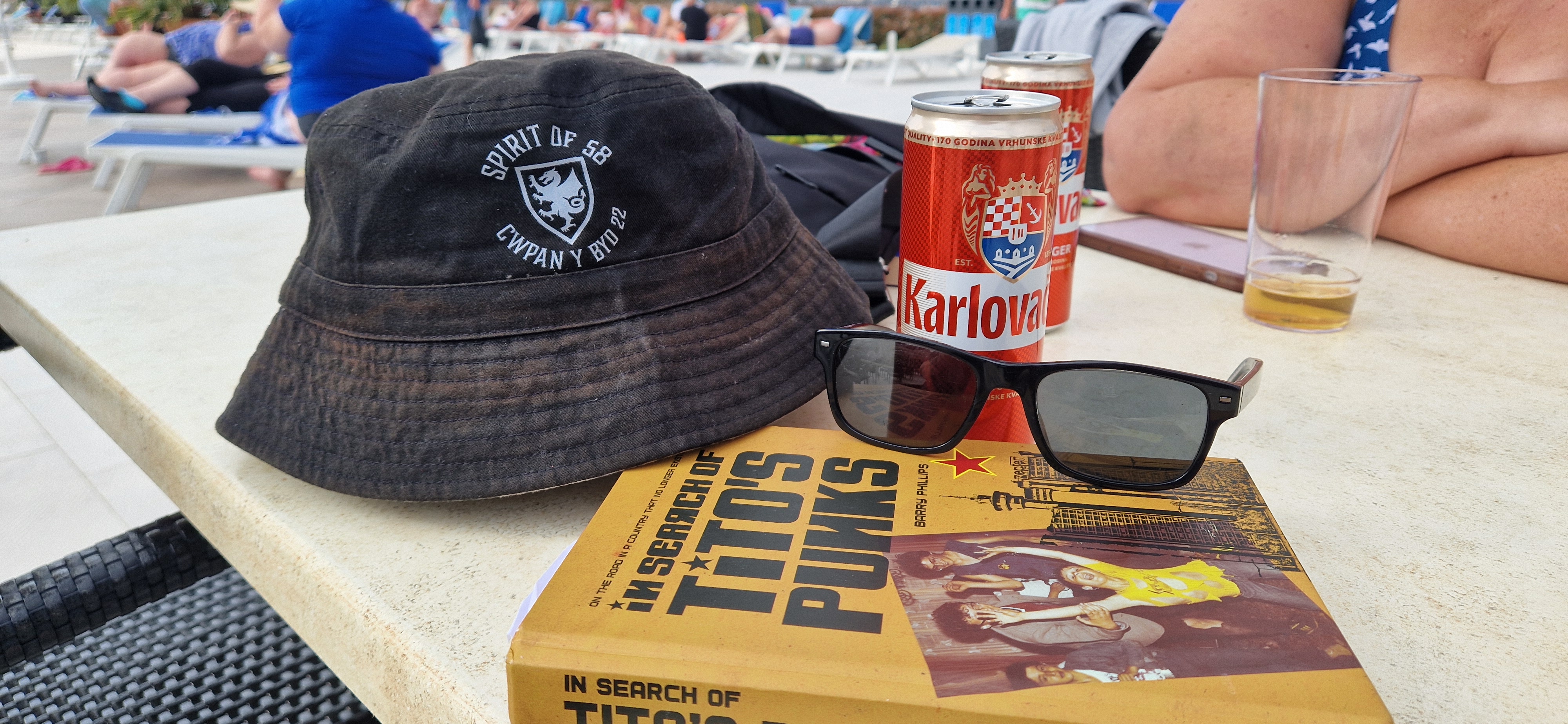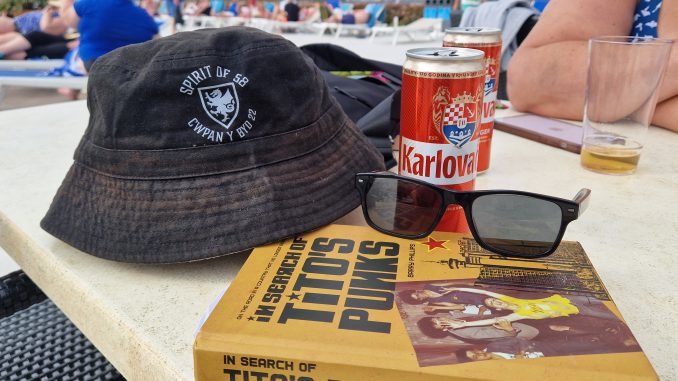
We had big plans for today. They were all put on hold when we couldn’t be arsed to get out of bed.
We wandered down to the dining room just as breakfast was morphing into lunch. It turns out, if you have a proper forage around the counters, there are vegetarian and even vegan options on the menu. Today there’s vegan pasta with bolognese or vegan mushroom risotto.
We drag ourselves down to the beach that forms part of this resort. There’s a view that starts with the Adriatic on our left, sweeps down the estuary with the Dinaric Alps watching over the town. Down to our right is the new harbour. There’s a huge bridge which is, erm, bridging the gap between the two sides of the estuary. There’s a cruise ship in the dock. The cruise ships have become notorious for depositing thousands of tourists in the town at one time. Sometimes there can be three or four of these huge things in dock at any one time.
A flotilla of asotred boats meander up and down the estuary, some are toys of the rich, some crammed with the last of the season’s tourists. We are booked onto one such boat for Tuesday.
Our little piece of the world is chilled to the gills though. It’s 24 Celsius, which is plenty for me. Apparently it can reach up to 40 here.
With the tourist season coming to an end, it means the beach is fairly quiet, which is how I like it. It does mean they are running low of stock at the bar and with the hotel closing next week, they ain’t going to do a big shop now. A scarcity of coconut and mint, means Pina Coladas and Mohitos are off the menu. We have to make do with Cuba Libre. I hope you guys realise the things we have to put up with researching this blog.
After much soul searching about what sights to see today, we decide not to see any. Human beings are diverse animals. I know many people who are happy to sit by the pool all day, every day, for two weeks. It’s completely alien to me though, I’m constantly wanting to see as much of the area as possible. To visit the museums, to walk the mountains, and drink the local beers. But holidays are supposed to be relaxing. We have just come back from eight days in Iceland completely knackered. Three days later we are back on a plane and bang at it.
As much as there’s a little man inside me saying ‘you need to go and do more tourism stuff’, there’s also a little man inside me saying that chilling by the pool is actually quite therapeutic and could result in having more energy tomorrow.
We go back to the room, I put on my mankini, and we hit the pool. Or at least the bar next to the pool.
But hey, this wouldn’t be a blog about Croatia if that was it. I put my feet up and pick up In Search of Tito’s Punks.
The thing is with buying so many books and not having time to read, you often find yourself abandoning a book because you have bought another one. The Japanese have a word for this. Tsunduko.
I started Tito’s Punks a few months ago after hearing it’s author, Barry Philips, being interviewed on a podcast. I never got around to finishing it though, due to Tsunduko. Now is a perfect time to pick it up again. Especially as Megan has been in the pool and it is, in her words, “fucking freezing”.
Tito’s Punks is inspiring, entertaining and frustrating in equal measure. Part travel book, part history book, part music book, it tells the story of Barry Phillips travelling around the Balkans meeting musicians, talking about music and politics, and wrapping it up in an eminently readable travel book. Why frustrating? Because this is a book I would have like to have written. I’ll have to write a different book now. Bastard.
Barry Phillips was bass player with Demob, a multicultural band from Gloucester in the early eighties that didn’t really make any major waves in the UK at the time. But in 2011 Barry receives a message via Facebook message advising him that their 1981 single No Room For You had been a massive hit in Yugoslavia, has inspired a generation of punks and had been covered many times. I grudgingly accept that he’s better qualified to write this book than me.
It reminds me a little of the story of Sixto Rodriguez (Sugarman) becoming famous in South Africa without his knowledge. It also reminds the countless American soul artists that had faded into obscurity only to be rediscovered on dancefloors in the North of England, resulting in a boom in the talcum powder industry, the resurgence of flares and shapes being thrown on dancefloors from Wigan to Stoke on Trent.
Another thing it reminds me of is a quote from Terri Hooley, of Good Vibrations Records, when he says, ‘London had the haircuts, New York had the trousers and Belfast had the reason’. Punk is, above all else, an anti-establishment art form. It is the sound of rebellion. It is the sound of the underdog. Whilst being a punk in the UK was a fashion statement that could result in you getting beaten up by Teds, being a punk in a place like Yugoslavia was more than just a fashion statement, it was a lifestyle commitment.
Bizarrely, Cob Records in Porthmadog, gets name checked a lot. Many Yugoslavian Punks used their mail order service, long before Amazon had even been dreamed of, to source their UK punk. Whilst there are arguments about the geographical origins of punk rock, there’s no disputing that once the ball got rolling, the UK was the driving force of what is generally considered to be punk rock . (Queue arguments about what punk rock is.)
There’s no doubt that the DIY ethic was a big part of Punk Rock and we hear of tales of Yugoslavian Punks not just copying UK punk sound, but being empowered to create their own networks, venues and labels. Dozens of bands appear in the book that have taken the influence of touring bands like The Ruts, The Strangers and The UK Subs and created a totally Yugoslavian scene.
The cultural background to this obviously changes. Tito was a revolutionary communist that held several leadership roles in Yugoslavia from 1943, including President from 1953 till his death in 1980. During the Second World War he was regarded as one of the most effective ant-fascist leaders in central Europe. After the war he did not align with either Europe or the Soviet Union. His rule, depending on sources you read, is generally considered to have been a dictatorship, but considered by many to have been a ‘benevolent dictator’.
After Tito died in 1980, Yugoslavia started to become more tribal, along historic national lines, and the unity Tito had presided over started to disolve.
Eventually, as the eighties turned into the nineties, Serbia tipped Kosovo’s pint, Slovenia and Croatia said ‘fuck this, I’m out of here’, the UN bouncers said ‘Leave it there, we’ve all had a drink’ and Bosnia had a kicking in the car park.
Between 1991 and 2001 there were a series of wars in former Yugoslavia, 140,000 people died and people are put on trial for genocide. It would be the worst conflict in Europe since the second world war.
Meanwhile the Punks are trying to just get on with each other and have a party in the back bar.
As well as music the book reflects on the cultural background and has personal tales from people that lived through these turbulent times, providing a different take on history to what you will find in most history books looking at the region.
With the Homeland War now history, we also get reflections on how the dominance of capitalism in the region is a mixed blessing, the mainstream music scene having been sanitised.
Interestingly, as an aside, traditional Balkan folk music was put through the techno filters in the Berlin underground in the 1990s and became a global dance phenomenon. Several compilations have been released and it is still a bit of a ‘thing’ today.
One of my favourite discoveries in recent years has been the Dubioza Kolektive, a collection of musicians and DJs from across the Balkans that all get along swimmingly and make a glorious racket that will get anyone with a pulse up and dancing. What’s more, they make a point of making all their music available to download for free. You can’t get more punk rock than that.
https://dubiozakolektiv.bandcamp.com/
Just like the Belfast punk scene of the 1980s, Dubioza Kolektive prove that music can brush aside constructed differences and unite people like no other medium can.
Eventually the pool bar closes and we head back to the hotel for an early night. We are off to Mostar in Bosnia tomorrow, so we will be up at stupid o’clock to catch the bus. Must remember our passports…
